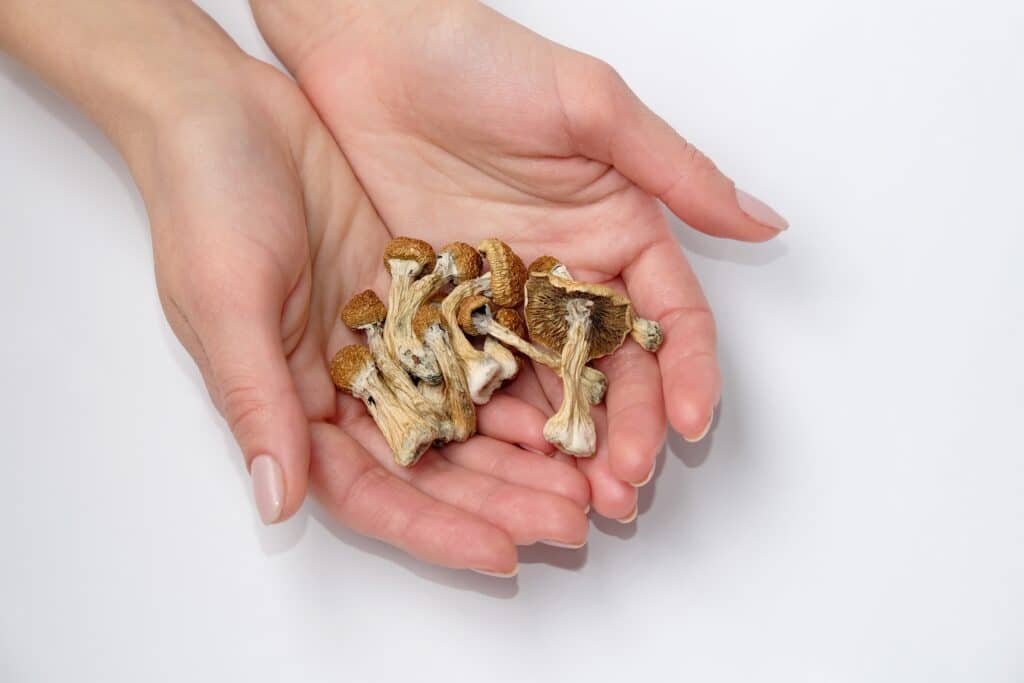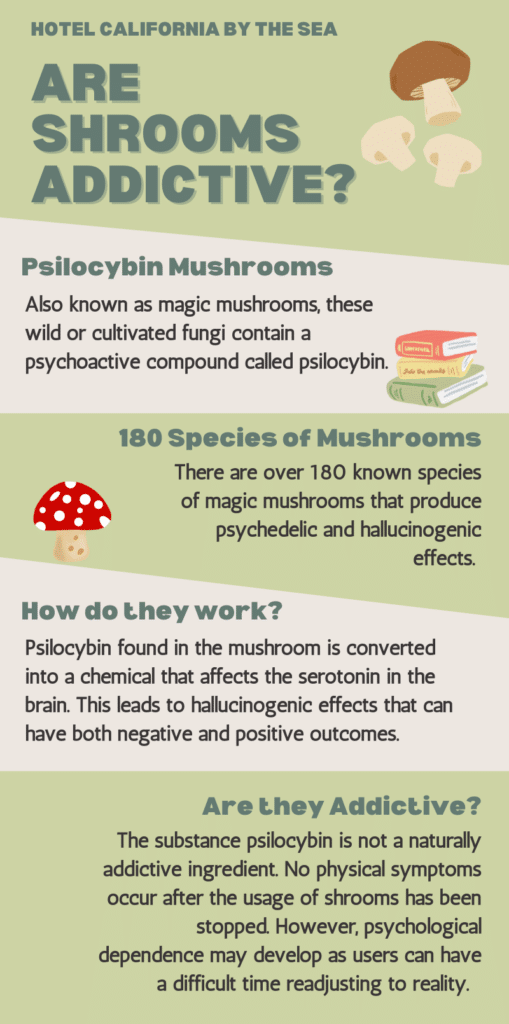Are Shrooms Addictive?
Psilocybin mushrooms are also known as shrooms or magic mushrooms. They fall under the category of naturally occurring fungi that contain psychoactive compounds. When taken, these mushrooms cause a hallucinogenic effect that changes the perception, thoughts and mood of the person. Are shrooms addictive?
The usage of psilocybin mushrooms has been controversial on many accounts. Because it is a natural substance, many believe its usage to be safe. Despite the claims of being a less dangerous drug, it is considered a Schedule I drug under the Controlled Substance Act. Meaning it has a high potential for abuse and there is currently no accepted medical use for the substance.
These wild or cultivated mushrooms contain the active compound called psilocybin. It is a hallucinogen that can naturally be found in many different species of mushrooms. There are over 180 species of mushrooms. It is the most well-known psychedelic according to the Substance Abuse and Mental Health Services Administration (SAMHSA). Not only is it well known, it is becoming increasingly popular among young people.

Magic mushrooms are usually found in North and Central America. Other common names of the mushroom include mushies, blue meanies, golden tops, liberty caps, or philosopher’s stones. Compared to other edible mushrooms, psilocybin mushrooms have long slender stems with a whitish-gray or dark-brown cap.
The mushrooms are often forged naturally. This can also be dangerous. Psilocybin mushrooms look similar to other species of mushrooms that are poisonous. People without the correct knowledge or experience of mushrooms can accidentally take poisonous mushrooms.
The effects of shrooms will be different from person to person. It can depend on multiple factors. This includes the number of mushrooms ingested, the intention of taking mushrooms, the person’s frame of mind when taking the mushrooms and the physical or social environment they are in when taking the mushrooms.
The most common methods of ingestion include dried forms that are eaten through food or drink. It can also depend on the potency of the shrooms. The potency factors are dependent on the species of mushroom, origin of mushroom, growing conditions of mushroom, harvest period of mushroom and whether a person ingests the mushroom fresh or dried.
How do magic mushrooms work on the body? The psilocybin found in the mushroom is converted into psilocin in the body. This affects the serotonin in the brain. By activating the serotonin receptors in the prefrontal cortex of the brain, functions such as mood, cognition and perception are altered. This then leads to hallucinogenic effects that often result when using magic mushrooms.
These types of mushrooms have traditionally been used as part of cultural, religious and spiritual intentions for many years. Today it is often used for recreational purposes to induce a sense of euphoria and feelings of sensory distortion. But recently, researchers have found that magic mushrooms could become an acceptable treatment for behavioral health disorders such as depression, anxiety, and substance addiction.
In fact, in 2018, researchers from Johns Hopkins University recommended the reclassification of psilocybin mushrooms to a Schedule IV substance. This would allow for more medicinal use. The research found mushroom therapy to be effective in relieving symptoms of emotional distress and in the treatment of substance use disorders.
In most places, magic mushrooms are illegal and have a high potential for dangerous health risks. In the past, obtaining mind-altering mushrooms was only available through illicit means. Now it is easily accessible online due to some states legalizing the substance for medicinal purposes.
Are Shrooms Addictive?
The substance psilocybin is not naturally addictive and is not generally considered to be an addictive ingredient. It is not a chemically addictive substance and produces no physical symptoms that occur after the use of mushrooms has been stopped. However, when constantly abused, users can develop a psychological tolerance of the substance. This tolerance will most likely lead to the development of psychological withdrawal symptoms, dependence and addiction.
Magic mushrooms have the ability to produce both positive and negative physical and psychological effects. The hallucinogenic properties alter reality causing one to hear, see and feel sensations that seem real but are not.
This drug-induced psychosis is a condition in which the person using magic mushrooms has lost the ability to effectively community, recognize reality and the ability to think rationally. When users stop using magic mushrooms after long periods of use, they can have a difficult time adjusting back to reality. This results in psychological dependence and the development of an addiction.

Symptoms and Side Effects of Magic Mushrooms
The psychedelic effects of the shrooms can cause a range of effects. On one end of the spectrum, it can cause frightening hallucinations, panic attacks, delusions or feelings of terror. in other words, it can cause a bad trips. In extreme cases, feelings of fear, agitation and symptoms that resemble schizophrenia are also common. On the opposite end, shrooms can produce a mild trip with feelings of relaxation, drowsiness and euphoria.
A dangerous side effect of using shrooms occurs when a person who experiences hallucinations or visual impairments long after the initial use of the drug. The condition is called Hallucinogen Persisting Perception Disorder (HPPD) and is also known as having flashbacks that can often be mistaken for a neurological condition.
Psychological Effects of Magic Mushrooms
- Visual and auditory hallucinations
- Psychosis
- Synesthesia
- Altered perception
- Elevated euphoric mood
- Anxiety and depression
- Paranoia
- Distorted sense of time
- Introspective experiences
- Nervousness and panic reactions
- Changes in consciousness
Physical Effects of Magic Mushrooms
- Numbness of the face
- Increased heart rate and blood pressure
- Dry mouth
- Nausea and vomiting
- Profuse sweating
- High body temperature
- Muscle weakness
- Dilation of the pupils
- Perceptual changes
- Stomach discomfort
- Headache
Check Your Insurance Coverage for FREE
Find out if your insurance covers addiction treatment in minutes. We accept most insurance!
How long does a typical Magic Mushroom dosage last?
The hallucinogenic effects of magic mushrooms begin within 30 minutes after a person ingests the drug. The “high” can last anywhere from 3 to 6 hours. Researchers found that 66% of the mushroom compound is metabolized and leaves the body within the first 3 hours after ingestion. After about 24 hours, the substance can become undetectable in many drug tests including a urine test.
How is Mushroom Therapy being utilized for treating Behavioral Health Conditions?
An estimated 20 million people in the United States struggle with a substance use disorder and the medications often used to treat these disorders can come with unpleasant side effects. New research is now exploring whether mushroom-assisted therapy can be an effective alternative to traditional behavioral health treatments. Why are researchers exploring this new avenue of medical health treatments?
The substance is naturally non-addictive, has low risks of physical dependence and can result in lasting effects. In combination with evidenced-based cognitive therapies, researchers have found that magic mushroom therapy has the potential to successfully treat symptoms of mental health conditions and substance use disorders.
In 2019, Denver became the first city in the U.S. to decriminalize the usage of magic mushrooms. Oakland followed shortly after. Other cities such as Santa Cruz and Ann Arbor have also worked towards decriminalization of psilocybin mushrooms. In 2020, Oregon became the first state to legalize magic mushrooms.
In a clinical trial published in the JAMA Psychiatry, studies found that psilocybin-assisted therapy caused a rapid reduction in the symptoms of major depression. Other studies have shown that mushroom therapy also reduced the risk of using other addictive substances such as cocaine, marijuana and opioids.
Reach out to Hotel California by the Sea
We specialize in treating addiction and other co-occurring disorders, such as PTSD. Our Admissions specialists are available to walk you through the best options for treating your addiction.
Despite not having a physical dependence, psilocybin mushrooms can lead to a psychological addiction. Hotel California by the Sea provides evidence-based treatments for substance use disorders such as an addiction to hallucinogenic and psychedelic drugs. Through multiple levels of care including drug detox, residential treatment, PHP and IOP programs, clients will receive a full spectrum of behavioral health care.
Unique treatment methods such as CBT, DBT and EMDR therapy provide clients with all the necessary tools and resources to understand and overcome their addiction. Hotel California by the Sea understands that addiction treatment is not a one-size-fits-all method. Clients will receive individualized treatment plans to cater to their personal struggles with addiction and recovery.
References:
https://www.addictioncenter.com/drugs/hallucinogens/psilocybin-mushrooms/
https://www.verywellmind.com/what-are-magic-mushrooms-22085
https://www.medicalnewstoday.com/articles/308850
https://adf.org.au/drug-facts/psilocybin/
https://time.com/6167638/psilocybin-addiction-therapeutic-breakthrough/
